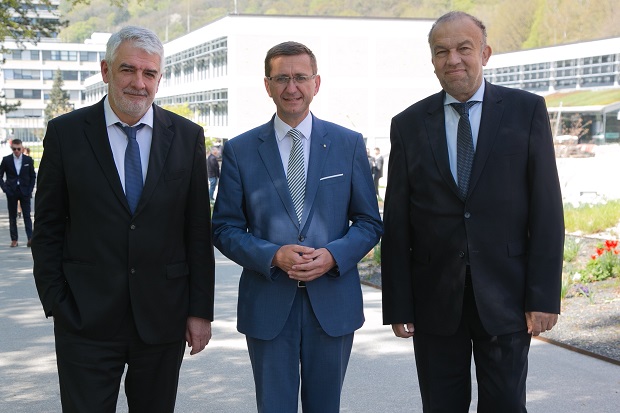Experts at a JKU conference discussed transitions in energy consumption and mobility, both in terms of urgency and successful attainability.

Organized jointly by the JKU Institute of Environmental Law, the JKU Institute of Administrative Law/Department of Technology Law, the LIT Future Energy Lab, and the JKU Energy Institute, the conference aimed at shedding light on the current legal parameters in regard to energy transition and discussing the topic together with leading experts in the field of energy and environmental law. The conference participants not only addressed legal opportunities and possibilities in the area of energy transition, but also spoke about the various obstacles and barriers.
Markus Achleitner, state minister for Economic Affairs and Energy, underscored: "Converting the Austrian energy system will also result in macroeconomic effects on account of expanding renewable energies and storage. An analysis conducted by the JKU Energy Institute clearly shows that the most decisive drivers of the overall, very positive development include a boost in investing in new electricity & heat production plants, and heating systems, as well as reducing the value-added outflow by purchasing less fossil energy."
JKU Rector Univ. Prof. Dr. Meinhard Lukas explained: "In the face of the pressing climate and geopolitical challenges, we can no longer put off changes in the way we consume energy and use transportation. These changes require rapid, efficient and coordinated mandates and measures in an effort to expand renewable energy options and reverse the mobility trend. Upper Austria is a location of industry, which is is both a challenge and an opportunity. We need joint efforts supported by the government, industry, the business community, and academia in order to support a much-needed CO2 neutrality. In this context, the law is also being called upon to not only create the procedures that will meet infrastructural demand, but will also satisfy the interests of participation under the rule of law."
For several reasons, this is currently not the case:
- Planning and procedural law calls for placing planning and approval one after the other, resulting in a clear lack of separating responsibilities. As a result, during each stage of the process, alternatives are re-examined; these "procedural loops" cost time and money.
- When it comes to public participation, this fundamental legal flaw results in conflicts - conflicts that can no longer be resolved during the approval process (because, for example, the decision regarding location was already made during the planning phase).
- The proceedings result in diffusing the balance of interests, meaning the outcome cannot be predicted: there is a lack of clear and committing guidelines, both in legislation and when it comes to enforcement.
- Appeal procedures are costly and time-consuming, requiring environmental studies to be continually updated; this results in yet more procedural loops, thereby dragging the proceedings out.
The conference yielded potential solutions. Univ. Prof. Dr. Wilhelm Bergthaler, JKU Institute for Environmental Law, remarked: "The law and corresponding procedures have to come about faster, be more decisive, and more open to innovation in the area of energy transition. The law has to integrate procedures instead of stacking them up, remove obstructions, and allow for flexible applications of new technologies." Univ. Prof. Dr. Erika Wagner, head of the JKU Institute for Environmental Law, agrees and added: "Turning transportation habits around is an intrinsic part of turning energy consumption around and we urgently need new legal parameters in order to make changes in the area of mobility. The law is being called upon to provide efficient and balanced procedures, taking environmental factors into account."








